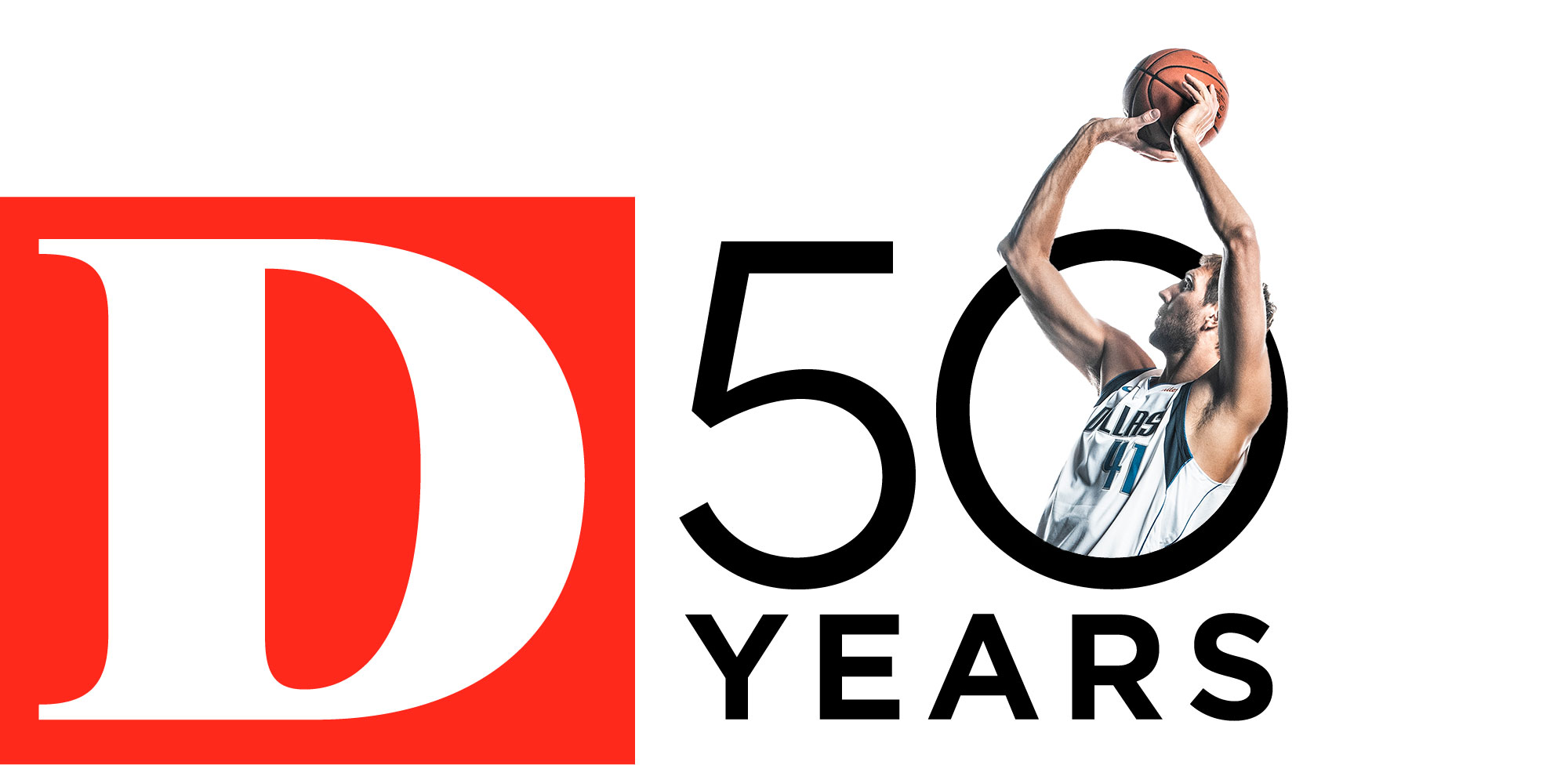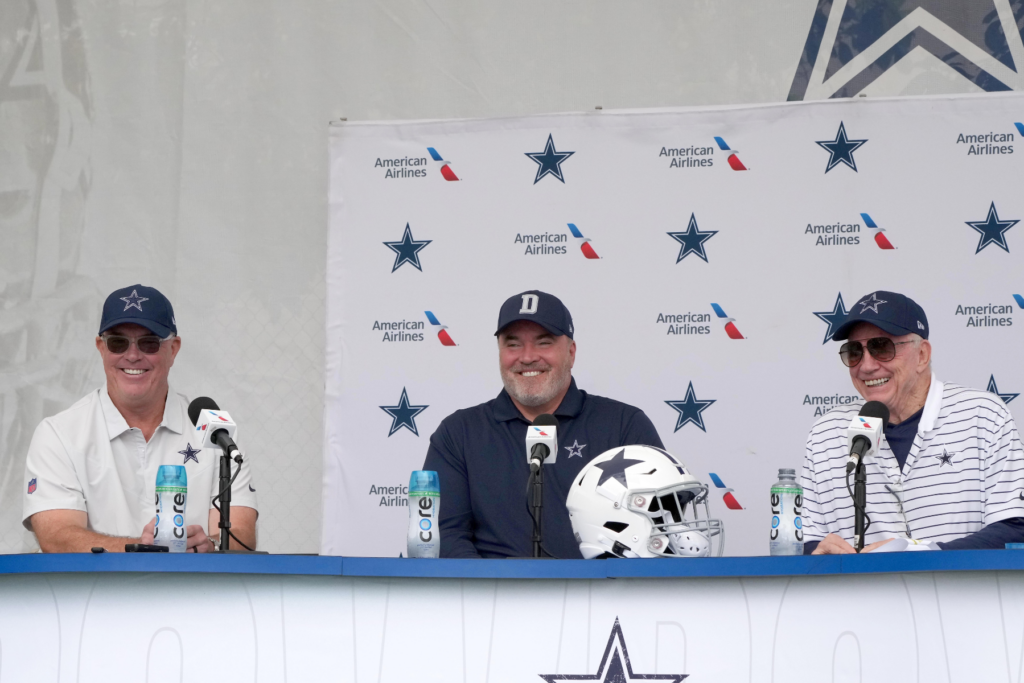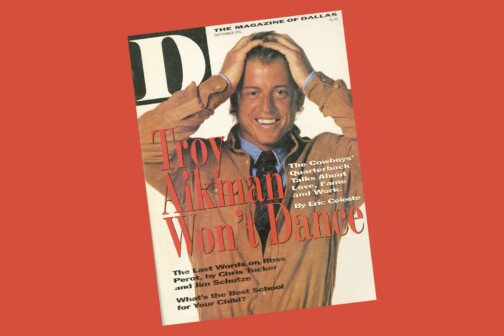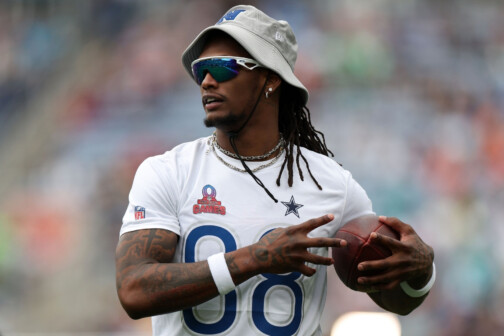The Cowboys have arrived in Oxnard, and what better way to kick off training camp than with a whole lot of lying. Over 63 minutes of media availability yesterday, they lied when they said they’ve helped their roster in free agency, and they lied about every key player from last year’s team who walked out the door doing so “totally” of Dallas’ volition, and they lied about the “availability” of those players being a sticking point for handing out big-money deals, and they lied when they declared there was nothing to any speculation about Mike McCarthy’s job status. None of those lies were particularly hard to suss out, either.
Which, whatever. Professional sports figures lie loudly and often, because there is rarely any repercussion for doing so. This is especially true when it concerns the world’s most lucrative sports franchise. If you have followed the Cowboys for any length of time, you either came to terms with the lying long ago, or you learned to swallow the lies whole. In either case, you stayed. Same goes for the people in my line of work; there’s too much money in the Cowboys machine not to cover them. Hence the unabated lying. And on Tuesday, like most every day with this team, the lies weren’t revelatory.
Truths often are, however, and the Joneses spilled two juicy ones in Oxnard—one amusing, one insightful. The former concerns the team’s lack of activity in free agency, a warranted complaint that Stephen Jones waved off in April by declaring that the Cowboys weren’t done spending. They were, though. The only non-draft picks the team has signed since then who played in the NFL last year are depth linebacker Malik Jefferson and kicker Liram Hajrullahu. (StrongSide’s Jake Kemp called out management a month ago.) So yesterday, the Joneses moved the goalposts: it’s good they didn’t spend money, actually.
Cowboys and Stephen Jones going with Plan “Dry Powder” this season and he really said “dry powder”…😂😂😂 take a listen…
— Kevin Gray Jr. (@KevinGraySports) July 26, 2022
(🎥: @dallascowboys) #CowboysNation pic.twitter.com/ErSItiA02m
Stephen Jones is correct that cap space is fluid and malleable in the NFL. But we wouldn’t be talking about that were it not for two specific words: “dry” and “powder.” If those sound familiar, it’s because they were the de facto codename for the Mavericks’ eminently doomed strategy from 2011 onward. Let good players go in favor of flexibility they could later devote toward better ones. It worked out so well that the Mavs went 11 years without winning a playoff series and, after losing Jalen Brunson in free agency, now boast one of the thinnest rosters for an NBA conference finalist in recent memory.
Why, exactly, the Cowboys believe this will work out better for them, a franchise historically loath to pay other teams’ players in free agency, is a mystery. Even if they were more aggressive on the open market, how feasible is it to upgrade on Amari Cooper, whose banishment to Cleveland freed up a large chunk of this cap room just as wide receiver salaries jumped to a higher premium (even if there’s reason to believe that Cooper’s status as an unvaccinated player played a significant role in his departure)? In all likelihood, the plan is to funnel those savings toward retaining their own talent instead—just not their top wide receiver (Cooper) or their second-most productive pass rusher (Randy Gregory) or their stalwart right tackle (La’el Collins). They claim it was—and still might be—to give some to Dalton Schultz, who will play the season on the franchise tag after the Joneses failed to entice him to sign a long-term contract. “We tried,” Stephen Jones told the media.
There the Joneses sat, grinning sly “just trust us” grins, either oblivious or indifferent to how poorly leaning into the most reviled team-building strategy in Dallas this millennium will play in this deeply skeptical city. It was so perfectly Cowboys. That’s especially true in light of Jerry Jones’ other, more important bit of truth-telling about 40 minutes in, when a reporter asked about his team being a decade and a half removed from consecutive playoff appearances.
“My curse is I don’t spend a lot of time on my mess-ups or what didn’t go right,” Jones replied. “ … I really do go to the successes.”
There is virtue in failure, but only if it’s acknowledged and heeded. Do that, and you learn from it, become sharper. Smarter. Better. Whether it’s more damning that Jones can’t do this or that he’s well aware of that failure isn’t the point, although it is a point. No, the point is how one soundbite sums up the whole doomed enterprise—the ongoing futility, the scattershot front office decisions, the serially ineffective head coaches, the continued dalliances with players who have off-field concerns, the intermittent grudge wielding from a man who professes to never let his money get mad. Hence “dry powder,” a pair of trigger words from a decade ago that have never worked and fly in the face of how the Los Angeles Rams built the best team in football. Why should anyone expect the Cowboys to grasp the Mavericks’ shortcomings when they can’t examine or grow from their own?
Which is where fact and fiction blur together. In the absence of self-critique, the Cowboys are as liable to tell themselves stories as much as they do us. It is not a terribly far leap between, say, Gregory spurning the Cowboys’ contract offer for identical terms with the Denver Broncos because of a clause he wanted removed and the Cowboys assuring themselves that, as the ones who wrote the terms, they were in control all along. Ditto the paradox of a public line in the sand about player availability despite re-signing Michael Gallup (who missed nine games last year and figures to miss plenty more in 2022), because being out of the lineup due to injury isn’t exactly the same as being suspended or unvaccinated. The outcomes are identically bad, so why not massage the circumstances in the name of something worth reflecting upon?
Which is absurd, of course. All of it is. The lies and the truth are rooted in the same soil with this team—that the broken things are fixable, and the unfixable things aren’t broken. None of that is changing any time soon, which is why a 26-year Super Bowl drought is quite likely to reach 27 this season. And when that happens, there won’t be a fun story to tell about it. That won’t stop the Joneses from trying—for the world as well as themselves.
Get the ItList Newsletter
Author






